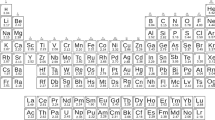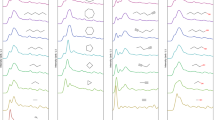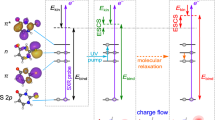Abstract
IN a recent communication we reported our first results on the application of ESCA (electron spectroscopy for chemical analysis) to the element carbon in organic molecules1. 1s electrons of carbon expelled by aluminium Kα radiation were found to form two well separated electron lines in benzenecarboxylic acid; one line corresponded to the benzene carbon and the other to the carboxyl carbon. The energy difference was 4 eV. Since then we have found many similar chemical shift effects for carbon in various organic compounds. Here we report some results involving the element nitrogen.
This is a preview of subscription content, access via your institution
Access options
Subscribe to this journal
Receive 51 print issues and online access
$199.00 per year
only $3.90 per issue
Buy this article
- Purchase on Springer Link
- Instant access to full article PDF
Prices may be subject to local taxes which are calculated during checkout
Similar content being viewed by others
References
Axelson, G., Ericson, U., Fahlman, A., Hamrin, K., Hedman, J., Nordberg, R., Nordling, C., and Siegbahn, K., Nature, 213, 70 (1967).
Author information
Authors and Affiliations
Rights and permissions
About this article
Cite this article
NORDBERG, R., ALBRIDGE, R., BERGMARK, T. et al. Shifts in Electron Spectra of Nitrogen in Organic Molecules. Nature 214, 481–482 (1967). https://doi.org/10.1038/214481a0
Received:
Published:
Issue Date:
DOI: https://doi.org/10.1038/214481a0
This article is cited by
-
Optical and x-ray-electron spectra of electrically conducting organic compounds based on tetracyanoquinodimethane and tetrathiotetracene
Theoretical and Experimental Chemistry (1976)
Comments
By submitting a comment you agree to abide by our Terms and Community Guidelines. If you find something abusive or that does not comply with our terms or guidelines please flag it as inappropriate.



